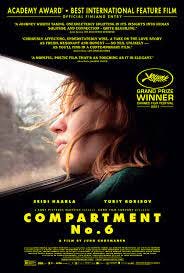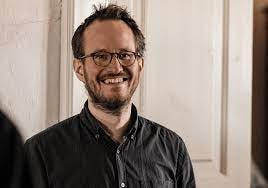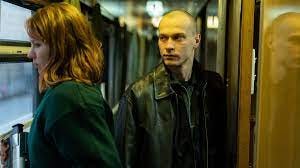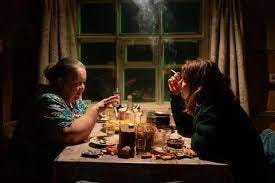'Only Parts of Us Will Ever Touch Only Parts of Others'
An interview with Juho Kuosmanen, the director of Compartment No. 6
In these disturbed and disturbing times, we need writers, artists and filmmakers who can provide us with something more than distractions and entertainment, and cinema has always had a special ability to take us to people and places that other art forms cannot reach. Some of the most memorable films have been constructed out of seemingly slight and even inconsequential material, and the Finnish director Juho Kuosmanen’s award-winning Compartment No 6 is a worthy addition to that tradition.
Based on Rosa Liksom’s novel, it’s a little marvel of a movie, which tells the story of a chance encounter between two seemingly ill-matched ‘strangers on a train’.
Liksom’s novel was set in the Soviet Union in the 1980s, and based round a train journey from Moscow to Ulan Bator. Kuosmanen’s film is set in late 1990s, against the background of a train journey from Moscow to the Arctic port of Murmansk, where shy Finnish archaeology student Laura heads off to look at the ancient rock drawings known as the Kanozero petroglyphs.
Laura should be going on a romantic trip with her Russian lover Irina, but when Irina changes her plans, she has to go alone. The film opens in a party at Irina’s Moscow apartment , where Irina charmingly toasts the lover she is effectively pulling away from.
Irina is polished, elusive, and seductive, and far more sophisticated than the gauche Laura. She reigns over a Moscow intellectual world that is emotionally cold, pompous, and a little too self-admiring for its own good. When Laura tries to join in a quiz game, one of Irina’s friends solemnly corrects her pronunciation of ‘Ahkmatova’, which only adds to her awkwardness and her sense of being an outsider.
Cast adrift and out of her depth, Laura heads off to Murmansk on compartment number six, which she shares with a seriously uncouth Russian miner named Lyokha, who is also on his way to Murmansk. Lyokha is very far from a dream companion. Stuffing pickles and vodka down his throat while smoking a fag at the same time, he makes crude sexual jokes and is something of a post-Soviet chauvinistic braggart. ‘Russia is a great country,” he slurs. “ We beat the Nazis. The moon? We went there.”
There is a hint of sexual menace in Lyokha’s leering drunkenness, which doesn’t bode well. As in all the great road movies however, things don’t turn out the way you expect and the journey to Murmansk becomes both an inner journey, and a journey through a seemingly bleak and inhospitable Russian world that is filled with unexpected flashes of warmth and humanity.
The result is a little marvel of a film that manages to be funny, touching and poignant, and gradually acquires a quiet emotional depth as the relationship between the two protagonists evolves. Not surprisingly Compartment No. 6 has won plaudits from critics and shared the Grand Prix award at last year’s Cannes Festival. I caught up with its director Juho Kuosmanen and spoke to him about his movie, and about Russia.
Q. One of the things that fascinated me most about Compartment No 6 was the way you captured the visual texture of post-Soviet Russia – the bleak apartment blocks and railway stations, the cold, ice and snow. Were you specifically trying to create that look, and is that why you reset the train journey to Murmansk rather than Outer Mongolia?
Yes. The film is based on a novel, so the first idea was to set it in the Soviet Union in the 80s. And our script was also supposed to happen there. But when we started to do the locations, we realised that it was better to set the film in the late 90s, because these places still exist and we could still use these existing locations. You don’t have to build everything from scratch because usually when you start to build things, you lose that authenticity.
Q. By choosing that period, you’re looking at a very different historical framework than the one in which the novel was set, because the 1990s was a period in which post-Soviet Union Russian society was on its knees. You show that in your film, and yet you also show how the poverty that is evident in the film is a shared experience. There’s a kind of resilience here. Was that your intention?
Yes it was. I kind of like this period, because after the nineties, as we now know, the Putin regime took Russia in the wrong direction. And in the late 90s even though there was a lot of poverty and it was quite a chaotic period, there was still hope and there was this kind of future that people would still believe in and see. So this kind of moment after the Soviet Union and before Putin’s Russia – I think that was interesting.
Q. Watching your film I was thinking of TransSiberian. Have you seen it?
No, I haven’t.
Q. Like your film it’s set on a train – the Trans-Siberian Express, but the image of Russia in that film is that Russia looks like hell and it is hell. In your film on the other hand, Russia looks like hell, and it isn’t.
Yeah. One of the aims of the film was to see behind this public image, this very generic idea that many people have about Russia. Obviously it’s a really weird country, so full of strong contradictions. And obviously the politics have been terrible for centuries. Even though the political system has changed, most of the time it’s been quite authoritarian, and this has affected the whole idea of the country and also about its people. When we think about Russians, we see them most often through their politics or through this kind of national identity. And I wanted to see people without this burden of nationality. It’s not the way we judge people or think about them. I think people should be judged by their actions.
Q. Did you have any personal experience of Russia before making the film that made you determined to show that side of Russia, the more human side?
Yes I have. I have lots of Russian friends. I’ve been travelling there. And I remember the first time I went there, it was quite scary. Some places can feel really unpredictable. But what I feel is that when you get to know the people, there’s almost always been this very heart-warming hospitality. and people are ready to help, and I think there’s lots of nice things that we don’t see because there’s also so many terrible things happening in the country.
Q. The film came out last year, but I saw it only recently. And as I was watching it I was very conscious of this other Russia that we’re now seeing in Ukraine. As a Finnish director, your own country has experienced this. Reflecting on that portrait of Russia in your film, how do you feel watching these horrors unfolding in Ukraine?
Well obviously, it’s an extremely sad and terrible situation going on in Ukraine, and I feel very disappointed that we even have to say this, but it’s not a surprise in a way . If you follow Russian politics over the last twenty years, it’s a very logical next step. They’ve been destroying Syria, they fought in Chechnya. Then they killed their own politicians and journalists, and human rights are really not good in Russia. So when we made the film, this side of Russia was already well-known.
Q. Yet nothing in the film is what you expect it to be. Nobody behaves the way you think they’re going to be. People show one side of themselves, and just when you’re about to make a judgement about them, you find a totally different side. And I just think it’s amazing how you bring out the inner lives of the characters in this confined environment of the train, on this very difficult train ride. Was this a fundamental message that you wanted to get across, that not only Russians aren’t who you think they are, but people aren’t who you think they are?
Yeah, it is. I think that people always change, if you give them the possibility, if you give them space you might start to see layers that are not visible in a first impression or first meeting. And I think this idea, this pre-defined idea of the Other, that we have when we meet people or when we travel or when have seen new things – we tend to see all these things in a very narrow way and it’s like narrowing down our own existence, because we have all these resources and all these ideas of others and we don’t allow them the kind of possibilities to exist in all their complicatedness.
Q. These layers and hidden sides that you talk about are all conveyed through the actors, and particularly in the stunning performance from Seidi Haarla. So much is in her eyes and her facial expressions. You feel like you know what she’s feeling in any given moment as you follow her emotional progression through the film. How much was this character of Laura created by her and how much was created by you? Was it a kind of dialogue that you had between you?
It's hard to say how much was created by her and how much was my creation. We started work one and a half years before shooting. So she was quite involved in this process for a long time. And we were still writing and reading the script together and commenting on it. We also talked about just random issues and I think these discussions helped us first of all to understand each other and then to understand the elements that we could use in the film.
Q. Some people have called the film a romantic comedy, but the connection that takes place between the two central characters isn’t romantic in a conventional sense. It has a kind of romance to it, but it’s not sexual. What is it, this connection? It’s a kind of mutual understanding of each other.
I think it’s a connection that comes through recognising another person and the feeling of being recognised. There’s this Marilyn Monroe quotation in the beginning of the film, that ‘Only parts of us will ever touch only parts of others.’ What happens in the film is that these parts become quite large between these two characters. They are opening up. They are showing a lot of themselves, and still they are accepted and not thrown away even in their weakest moments.
Q. One of the most compelling things about the film is the train itself. Many train journeys have been filmed, I’m sure you’ve seen a few of them. TransSiberian, Some Like it Hot, From Russia With love, Strangers on a Train come to mind. But there’s never been a train like the one you filmed. You can see bare feet sticking out of bunk beds. You can almost smell the pickles, vodka and cigarette smoke. What was it like to film in these conditions?
Well, it was quite demanding and challenging. It was also very slow, quite stressful. But very interesting. When the production company suggested that we should do this in a studio with a green screen I was like, absolutely no, because I really wanted to create that feeling of being on a train. It’s not just a story that happens in the frame. It’s more about feeling than the story and therefore I felt that okay, we have to show that in a train. Luckily, even though the conditions were not ideal, I think we got much more out of this than we had to give away.
Q. So the other travellers on the train, they weren’t really extras as such, they were literally people on the train and you just involved them?
No, no, they were our extras.
Q. So you had to use a real train, but you had extras put on the train as passengers. It wasn’t like an actual train journey that you filmed as such.
No. An old friend rented a train with three carriages, and we were driving around everyday.
Q. It seems so natural, the way people are behaving. I mean you almost think you could be watching a documentary. You see people playing cards, drinking, smoking, they all look as if they were doing exactly that.
I think we had great extras. We also had to train people actually, the directions about what they can and can’t do. So basically they were just hanging around there. They did want they wanted to do. I think that kind of creates a documentary feel. It was worth all the pain it caused. It was really hard but it was really worth it. We got what we went to do.
Q. When you talk about the pain, you’re talking about technical difficulties?
Yeah, technical difficulties. And I mean, the air was running out. We were running out of oxygen and it’s really bad when you’re having to pack a train for twelve hours. It’s not an ideal situation at all. It’s more like an adventure.







What a great interview, Matt! I can't wait to see the film.